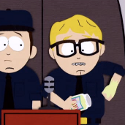|
As has been stated much previously, the original Cleric was literally Van Helsing with healing powers, because the group needed some way to recover healing and one dude wanted to play Van Helsing. So to correctly roleplay a Cleric, start at Jesus Van Helsing and progress from there.
|
|
|
|

|
| # ? Jun 11, 2024 13:42 |
|
It's amazing how regressive D&D is compared to hearing stories about guys in the early days playing balrogs and vampires and having entire classes made just because it was what people wanted to play/needed in the game.
|
|
|
|
Have Some Flowers! posted:That was 4E's approach. "We know healing is boring and monotonous, so now you can be half of another class while you heal." And for a lot of people, being a bad something else while still fulfilling the groups needs for healing was fun enough. But I think that's still inherently admitting that healing itself is boring. I don't understand this; if anything Clerics in 3rd edition where better/more interesting in combat than pure martial classes in addition to having all the healing spells. When I played a Cleric it was always a decision of "do I heal this party member or take out a monster who might threaten him next round?" not just automatic healbot.
|
|
|
Clerics healed in combat in 3.X?Splicer posted:As has been stated much previously, the original Cleric was literally Van Helsing with healing powers, because the group needed some way to recover healing and one dude wanted to play Van Helsing. So to correctly roleplay a Cleric, start at Jesus Van Helsing and progress from there. Darwinism posted:It's amazing how regressive D&D is compared to hearing stories about guys in the early days playing balrogs and vampires and having entire classes made just because it was what people wanted to play/needed in the game. Can't have any of that fun getting into my serious pretendy game playing. We have tradition to uphold here! At what point does D&D turn into a fantasy heartbreaker itself?
|
|
|
|
|
Rutibex posted:I don't understand this; if anything Clerics in 3rd edition where better/more interesting in combat than pure martial classes in addition to having all the healing spells. When I played a Cleric it was always a decision of "do I heal this party member or take out a monster who might threaten him next round?" not just automatic healbot. The situation you describe could happen but it was too much of a rare occurrence to to be considered the tactical gimmick of the class. Usually the fight either went so well that there was no need for healing, or it was pretty clear that you needed to spend an action healing a team mate if you didn't want him to die on the next round. The only actual choice involved was deciding whether you should go with the Cure Critical wounds, or just throw a CLW now and save the big one for later.
|
|
|
|
Rutibex posted:I don't understand this; if anything Clerics in 3rd edition where better/more interesting in combat than pure martial classes in addition to having all the healing spells. When I played a Cleric it was always a decision of "do I heal this party member or take out a monster who might threaten him next round?" not just automatic healbot.
|
|
|
|
Kai Tave posted:Which is, at this point, the best thing Mike Mearls could say about Warlords. 4 paragraphs talking about wizards being able to swap spells at will because it might hurt the wizard player's feelings if he took burning hands and they went up against fire elementals, while going on about how awesome and versitle magic is, and some talk about possibly removing dead levels, and mentioned that a fighter maneuver might be along the lines of a boost to accuracy. Woo. I apologize if I sound bitter, but does anyone feel like Mearls is missing the point when it comes to "Linear fighter, quadratic wizard" and why that angers alot of people? Anyways, so this post isn't just me bitching, I love Boston Pizza's Boston Brute sandwich and cactus cut potatoes. Does anyone have recipies to make something similar to a Boston Brute and cactus cut potatoes?
|
|
|
|
Rutibex posted:I don't understand this; if anything Clerics in 3rd edition where better/more interesting in combat than pure martial classes in addition to having all the healing spells. When I played a Cleric it was always a decision of "do I heal this party member or take out a monster who might threaten him next round?" not just automatic healbot. The reason for that choice is consistent with what I'm saying - healing in these games is inherently rote and boring, so they have tried to make playing the healer more bearable rather than making the process of healing more interesting. Rexides posted:The situation you describe could happen but it was too much of a rare occurrence to to be considered the tactical gimmick of the class. Usually the fight either went so well that there was no need for healing, or it was pretty clear that you needed to spend an action healing a team mate if you didn't want him to die on the next round. The only actual choice involved was deciding whether you should go with the Cure Critical wounds, or just throw a CLW now and save the big one for later. I would love to see an experiment where players were not allowed to share more than 2 or 3 words during a round of combat, and only with players of characters who are near their own. Players typically coordinate their actions in combat like some telepathic hivemind, and healing is just especially boring in those circumstances. Hell, most of the party winds up doing whatever the most experience player tells them to do. Now, if the bloodied fighter has no idea that you're planning on sprinting through 2 opportunity attacks to save him? Holy crap is he going to love you forever. And if the rogue thinks you're going to try for it, and he happens to tangle up one of those guys, and the Wizard Hold Persons the other? ESPN Play of the Night, and everyone is feeling great. They made the tough calls AND played their characters the way they wanted to. If the fighter has been playing for 10 years and just got to tell everyone else what they were about to do? Snorefest.
|
|
|
|
Randalor posted:
Cactus cut potatoes are pretty easy, just slice some spuds thin with either a mandolin or a sharp knife, toss them in oil, salt and pepper them, then lay them out on a cookie sheet and cook for... probably about 10 min, then flip them over and give them some more time.
|
|
|
|
Darwinism posted:having entire classes made just because it was what people wanted to play/needed in the game.
|
|
|
|
Der Waffle Mous posted:I dunno. Sometimes the act of healing could be pretty fun. I think this is the key, really. I liked Pathfinder's "Channel Energy" because you could heal plus a bunch of other nifty things and it didn't even take up your spell slots. They need to find a way to make healing at the very least interesting. That, and they could have different ways of utilizing the support role. Wizards in 3.x come to mind; in the upper levels they, in my experience at least, made healing more or less obsolete by simply altering the battlefield, buffing and debuffing, and generally minimizing or outright preventing damage from taking place. A class or perhaps cleric/druid build that simply made the party stronger so the fight went faster therefore lowering the amount of time the enemy has to cause damage would be an alternative way to support. In fact, I think this is exactly what the warlord could do. Intimidate and therefore weaken the enemies while simultaneously giving their allies peepee pats so they hit harder and defend themselves better. That said, hit points do not directly represent physical damage, which has been said, so they should still be allowed to heal. But whatever.
|
|
|
|
FRINGE posted:This was always common in our 2e groups. Based on these threads we were a fortunate minority or something. Nah, most groups I've seen are pretty cool with improv classes. It's just that the specific type of rear end in a top hat "I am your god" DM that gets brought up so often in these threads is one of the types that usually doesn't allow it.
|
|
|
|
Winson_Paine posted:Cactus cut potatoes are pretty easy, just slice some spuds thin with either a mandolin or a sharp knife, toss them in oil, salt and pepper them, then lay them out on a cookie sheet and cook for... probably about 10 min, then flip them over and give them some more time. I know they're basically just dollar fries with a kick, but I'm not sure what it is that gives them the spicyness. Are they just soaked in jalapeņo juice for a while after being cut, or is there more to it?
|
|
|
|
Randalor posted:I know they're basically just dollar fries with a kick, but I'm not sure what it is that gives them the spicyness. Are they just soaked in jalapeņo juice for a while after being cut, or is there more to it? AFAIK it's just crushed red pepper.
|
|
|
|
Have Some Flowers! posted:Yep, I agree. And healing is far more collaborative by nature than most actions. What I mean by that is, the entire party probably has an opinion on whether or not you use your CLW or Cure Critical Wounds. So not only are the decisions fairly black and white, they're also mostly out of the healer's player's hands anyway. Oh yeah, that too. Before 4E, if the Cleric wanted to heal, he had to consult that player about his current HP, his maximum HP, his current plans about the battle, what kind of insurance he had etc. 4E really streamlined things with healing surges, and I don't understand why we have to go back to "Cure X Wounds" style accounting.
|
|
|
|
OtspIII posted:Nah, most groups I've seen are pretty cool with improv classes. It's just that the specific type of rear end in a top hat "I am your god" DM that gets brought up so often in these threads is one of the types that usually doesn't allow it. I've never been that rear end in a top hat DM, but I usually ask people to stick with the core classes and reskin them to whatever they like. That is, if you want to be a cleric dude (heals, fights) but don't like the God part, then by all means they can be a dude who learned to heal with arcane magic, a guy who reikis the gently caress out of people, or any other explanation they care to choose. But if it really matters to someone that they get to be a genuine Arse Dwarf Bog Iron Defender From The Sewage Swamps Of Porcelanus as detailed in supplement 529c(i) (and just putting "dwarf fighter" and saying that they're a whatever whatever doesn't work for them), then I'm not going to say no. Our 4e games are, by mutual agreement "original 3 books + errata with MM3 math". As much as I don't like to restrict people, I really can't see anything wrong with "hey, can you guys stick to core please? I don't really want to have to read another 5 books to figure out exactly what it is you're doing". Then again, we all remember the clusterfuck that was 2e with 10 "complete book of x" and a campaign setting in play at the same time. Did you guys ever do that? Everyone uses a race book and a class book and a campaign book to make characters, and then you find out 2 sessions later how hilariously broken one guy has managed to be when he looks down at his character sheet and mumbles something like "...my Thac0 is 3, I think". Everyone says "wait, what?" and when you check it out, it turns out he's actually at -1 Thac0, +47 to damage, and his armor class is somewhere in the -2 to -8 range depending on how you're interpreting this one rule. And he did it mostly by accident by stacking up options that sounded cool, and is in a party with one guy who built his character the same way and ended up completely useless at everything, but he has a really nice horse and shiny, shiny, banded mail. It's a bit like walking into an unknown pizza shop and pointing blindly at their "gourmet" menu. Sometimes you'll get something that's awesome, sometimes it will be an oily disc of failure with a thousand artichokes, 3 prawns, and some vile sauce. Elector_Nerdlingen fucked around with this message at 01:35 on Mar 12, 2013 |
|
|
|
4e is balanced enough where you don't have to really worry about that though. About the worst you can end up with is a Runepriest or Seeker, which are still viable. The strongest things in 4e are for the most part in the PHB 1 unless your players are doing some obvious powergaming cheese but it's generally pretty easy to tell when they are doing that whether your disallowing certain books or not. I can see doing it in 2e and 3.Pathfinder because they are unbalanced messes but it's not terribly necessary in 4th.
|
|
|
|
goldjas posted:4e is balanced enough where you don't have to really worry about that though. About the worst you can end up with is a Runepriest or Seeker, which are still viable. No, the worst you can end up with is a Binder. Friends don't let friends play Binders.
|
|
|
|
quote:For instance, fog cloud as currently written in our tests hinders vision for your enemies, but not for you and your allies. We are now looking to modify this, and our change in emphasis means that we don't need to worry as much about making it strictly beneficial. We can make the spell a little simpler and apply its effects to everything. You won't use fog cloud unless you can afford to hinder your allies. If you don't want to do that, you can cast something else. Preparing fog cloud doesn't shut down your ability to use other spells. Does this paragraph read as bad logic to anyone else? A spell that hinders my enemies is less complicated than one that doesn't. Also preparing fog cloud literally means you didn't prepare something else. Also I picked up sweet vermouth instead of dry vermouth for martinis. I'm not much of a martini man, but is this going to be a problem?
|
|
|
|
Probably, yes. Sweet vermouth is typically for bourbon and whiskey drinks.
|
|
|
|
AlphaDog posted:I've never been that rear end in a top hat DM, but I usually ask people to stick with the core classes and reskin them to whatever they like. That is, if you want to be a cleric dude (heals, fights) but don't like the God part, then by all means they can be a dude who learned to heal with arcane magic, a guy who reikis the gently caress out of people, or any other explanation they care to choose. Oh yeah, I didn't mean to imply that not allowing them is an rear end in a top hat move, just that when it (or, really, any other position) comes up it tends to come up being quoted from the mouth of someone terrible. I wouldn't be up for custom classing in any system older than 2e, and even in something with pretty straightforward classes it all relies on knowing what the group is okay with. Generally if someone has a really interesting character concept that they can't do with a normal class or with the one freeform 'special ability' everyone gets I'll just give an existing class a few special features and take away other features and/or bump up the XP curve. It's never an optimal choice (although I try to make it as balanced as possible) from a mechanical perspective, but the whole idea of trying to make a custom class in an effort to gain a special advantage for yourself is dumb anyway. AlphaDog posted:But if it really matters to someone that they get to be a genuine Arse Dwarf Bog Iron Defender From The Sewage Swamps Of Porcelanus as detailed in supplement 529c(i) (and just putting "dwarf fighter" and saying that they're a whatever whatever doesn't work for them), then I'm not going to say no. I actually am way more up for making a OD&D custom class than juggling 3rd party or supplement flood poo poo with later editions. I'm not sure I've ever actually seen a player go for a deep supplement prestige class/class in 3e because they had a pre-existing character concept they were trying to build. It's always just hunting for mechanical advantage and game-breaks.
|
|
|
|
goldjas posted:4e is balanced enough where you don't have to really worry about that though. About the worst you can end up with is a Runepriest or Seeker, which are still viable. The strongest things in 4e are for the most part in the PHB 1 unless your players are doing some obvious powergaming cheese but it's generally pretty easy to tell when they are doing that whether your disallowing certain books or not. We all know this on an intellectual level. Getting over 15 years of 2e is apparently pretty hard though. Also, sticking to core makes the game cheap. I probably spent nearly $2000 on 2e in the 90s (admittedly at the ripoff Aussie prices). Now my 4e material consists of the core box (which I bought online for cheap) and (unfortunately) the first adventure series which a friend gave me on the condition that I'd run it. I never saw any reason to buy more, since it's so obviously reskinnable that you can make whatever character you want with a minimum of effort. I'll probably do the exact same thing with Next, or maybe pick it up second hand early on (which I should have done with 4e). Once it's released, I won't feel good about discussing it unless I own the books and have played a bit. I refuse to be one of those people who bitches endlessly about new stuff that they haven't actually used. OtspIII posted:I actually am way more up for making a OD&D custom class than juggling 3rd party or supplement flood poo poo with later editions. I'm not sure I've ever actually seen a player go for a deep supplement prestige class/class in 3e because they had a pre-existing character concept they were trying to build. It's always just hunting for mechanical advantage and game-breaks. Me too. OD&D or basic/expert are awesome for that sort of thing. I haven't seen anyone do that either, but I have seen plenty of reading the books and going "that looks cool, this looks cool, that looks cool, I'm half this half that wizard/something/fighter/thing" which produces broken (good or bad) stuff without much effort or lack of effort, so even if you're not trying for cheese, you're somewhat likely to get it by accident. Elector_Nerdlingen fucked around with this message at 03:35 on Mar 12, 2013 |
|
|
|
Kai Tave posted:Rulebook Heavily did extensive writeups of several 4E deities on RPGnet back in the day, including how the different divine classes would function as a part of that god's particular organization. The best he did was for Ioun, whose clergy was waging a constant shadow war against the servants of Vecna and for whom falling into "fallacy" was tantamount to sin, but he also did good ones for Avandra aaaaand I think Erathis? They were easily good enough to have gotten Dragon articles and were, in fact, better than some of the published Channel Divinity material we did get. My favorite character concept is a Blackguard of Pelor. The idea was that no matter how bright the sun shines, there is always places where it cannot get to. And for that, shadows are necessary to enforce those who hide amongst them (i.e a Blackguard can do what a Paladin cannot.)
|
|
|
|
Classtoise posted:My favorite character concept is a Blackguard of Pelor. God's sanctioned hitman? Awesome.
|
|
|
|
Kai Tave posted:Rulebook Heavily did extensive writeups of several 4E deities on RPGnet back in the day, including how the different divine classes would function as a part of that god's particular organization. The best he did was for Ioun, whose clergy was waging a constant shadow war against the servants of Vecna and for whom falling into "fallacy" was tantamount to sin, but he also did good ones for Avandra aaaaand I think Erathis? They were easily good enough to have gotten Dragon articles and were, in fact, better than some of the published Channel Divinity material we did get. MadScientistWorking fucked around with this message at 15:46 on Mar 12, 2013 |
|
|
|
Speaking of awesome classes that I wish would come back. Invokers. I guess you could probably just build a cleric as a spellcaster in the new system, but I doubt it'll feel the same.
|
|
|
|
AlphaDog posted:God's sanctioned hitman? You know, this just made me remember the game Painkiller for the PC and now I totally believe that's what an Avenger is all about. Have Some Flowers! posted:The funny thing is 4E mostly did away with even that judgment call by having baseline healing be Minor actions rather than Standard ones. The problem with this stuff is twofold, though. First, healing IS boring by nature. If you've ever played the game League of Legends, its designers have gone on record a ton (an absolute ton, we're talking literally hundreds of times) talking about how healing that isn't of a 'burst' nature AND highly limited is not just boring, but broken as all hell, offering very detailed explanations on why reliable, persistent healing just encourages turtling and outlasting the opposition, and how even when proofed against those problems healing ranks very low in their preferences for what tools to add to a character's kit. Conversely, shields (stacks of hitpoints that are temporary in nature and are depleted first, THP in other words) are liked because they allow another player to successfully dive into the heart of the enemy team and pull off clutch plays proactively. Healing just makes you more capable of doing battle for a longer time, instead. I don't think anyone has pulled off true healing that wouldn't count as rote and boring, and this would be a terrific design challenge to put up sometime. The other part is that the idea of being unable to communicate is one of those things that both sounds interesting on paper and is terrible in practice AND is really easily subverted anyways AND is moronic in implementation (why can't I just shout and be heard by a dude 30 meters from me? That's 20 squares in 4e measurements to give you an idea, which is more or less the maximum distance you usually see between combatants). It would either be ignored by groups because it's a pain in the rear end and punishes people who aren't good at playing the game unfairly (because an optimized party will just develop a set of one-word codes and totally invalidate this nonsense or buy telepathic items, while people who are there to pretend they're elves and have fun won't), or it'd be enforced and result in a lot more deaths than you'd expect. It's just not a good idea because rules have to be created so that they cannot be broken by dedicated people, yet not inconvenience dabblers. (Don't have any foodchat to offer, sadly. I tend to burn myself when making some toast. Sorry everyone! Transient People fucked around with this message at 11:09 on Mar 14, 2013 |
|
|
|
Transient People posted:(Don't have any foodchat to offer, sadly. I tend to burn myself when making some toast. Sorry everyone! Use the toaster for the bread, not your hands
|
|
|
|
Transient People posted:The problem with this stuff is twofold, though. First, healing IS boring by nature. Woah, this is just wrong. Healing can be a blast if it's properly implemented and integrated into a game. If it's just whack-a-mole to keep your team's green bars green, yes that can be boring poo poo. It's fun when you're handing out temporary HP and DR to mitigate damage, buffing and clearing conditions, managing resources, and routinely saving everyone's butts. It's fun when you're engaged and interacting in many different ways, and you're arguably the most important person on the team. As the healer, you're responsibility is keeping everyone playing. And that's a problem with table-top: Healing isn't mandatory. You're not going to have fun healing if everything you do is "extra" because the encounter is tuned for your not showing up. The Warlord was important because it opened the door to fun healing. You didn't have to be a living wand of Cure Light Wounds. From day one, HP was an abstracted amalgamation of combat factors - but D&D rules didn't reinforce this at all because the only way to get them back was with spells that stitch your wounds closed or stuff your guts in. The Warlord's confidence / morale boosting and bolstering brought HP back to its roots. But people weren't able to imagine their hero getting rattled, or HP as anything other than a measure of how much blood is in your body.
|
|
|
|
The most fascinating thing about D&D Next is watching every issue that gets discussed/resolved in a completely different manner with people coming from all sides of the equation. This edition so drat screwed purely on the basis of everyone being annoyed/angry/impressed/confused to every single issue. Anyway since im not really a D&D player I wanted to ask, what are people's thoughts on the game developing a character into non-combat abilites? Is giving major options and/or focus in that area against what people enjoy about?
|
|
|
|
kingcom posted:The most fascinating thing about D&D Next is watching every issue that gets discussed/resolved in a completely different manner with people coming from all sides of the equation. This edition so drat screwed purely on the basis of everyone being annoyed/angry/impressed/confused to every single issue. I would love to see non-combat advancement completely broken out and divorced from combat advancement, in a category every bit as significant as class. It's a huge deal for me and something I'd love to see developed. I thought that would be what Background/Theme were going to be doing, but apparently not.
|
|
|
|
It seems a good candidate for a module. I prefer core to remain simple, and I think that the background system does that to a good extend. An exploration module could add more crunchy exploration options, and then maybe an interaction module could do some stuff that we see in more indie games.
|
|
|
|
Rexides posted:It seems a good candidate for a module. I prefer core to remain simple, and I think that the background system does that to a good extend. An exploration module could add more crunchy exploration options, and then maybe an interaction module could do some stuff that we see in more indie games. Yeah I could certainly see that argument. I feel like at this point simplicity is all Next really has. If they want to be that game, they should embrace it.
|
|
|
|
I think they got the interaction part right. When the game is mainly about killing orcs, then having your background be "Priest: get +2 to Diplomacy and Religion checks, can lodge for free in churches" can be simple enough (haven't checked the latest playtests, could be wrong). It's the combat/magic part where they have gone against their own maxim just so they can make the Core "D&D"
|
|
|
|
Transient People posted:The other part is that the idea of being unable to communicate is one of those things that both sounds interesting on paper and is terrible in practice AND is really easily subverted anyways AND is moronic in implementation (why can't I just shout and be heard by a dude 30 meters from me? That's 20 squares in 4e measurements to give you an idea, which is more or less the maximum distance you usually see between combatants). It would either be ignored by groups because it's a pain in the rear end and punishes people who aren't good at playing the game unfairly (because an optimized party will just develop a set of one-word codes and totally invalidate this nonsense or buy telepathic items, while people who are there to pretend they're elves and have fun won't), or it'd be enforced and result in a lot more deaths than you'd expect. It's just not a good idea because rules have to be created so that they cannot be broken by dedicated people, yet not inconvenience dabblers. There's plenty of fluff for why you could impose some rules on detailed chatter during combat. We don't think of combat as quick because it takes us 30 minutes or an hour to resolve it. But in the game, it's taking place in matters of seconds, maybe a minute at the longest. In combat, your shout would be drowned out by grunts, screams, metal on metal, fireballs, other people's communication, and so on. That's like saying "why did armies come up with flag and smoke systems to communicate with their troops? Couldn't everyone have just yelled louder?" Could you imagine screaming at the top of your lungs for a minute straight? Could you make sense of anything if 5 people were all screaming at the top of their lungs, too? There are other issues, too. Should a rogue trying to act stealthily be able to yell back to everyone else what's going on and what they should be doing? Should a wizard actively casting spells be able to carry on conversations at the same time? Conversely, I think it would be pretty cool to see a party come up with one word systems, hand gestures and other things to be more effective in combat. That would be like... a real combat force or something. Even if the party had a telepathic link, there's still only so much correct information you can convey in a few seconds. "Move, I'm fireballing!" "Move where? Fireballing where?" The difficulty of encounters isn't an issue because the DM should be adjusting the difficulty based on the aptitude of your party. The party's ability to work as a team is part of that. Again the goal is to give players back their autonomy. Healing would be more interesting in an environment where the rest of the party wasn't directly dictating the actions of the healer. This is one of those things where the entire party would have to be on board for it, but I think the experience would be better for everyone involved.
|
|
|
|
Have Some Flowers! posted:The problem with detailed conversation during combat is that the better players will boss the lesser players around. I guarantee you that there is one player at your table who can play everyone's characters better in combat than they can. And he will, if you let him. That's awful for bringing new people in to the game, and it sucks for your average player as well. I find this problem is much less of an issue when a combat takes about as long to resolve in the fiction as it does in play. I've been running Dungeon World weekly for newcomers and old hands alike for about 4 months now, the mechanics are simple enough and the combat dynamic enough that people are very willing to let people go wild and see what happens rather than micromanage everything. I know there's a market for DnD's style of extremely tactically complex combat, but I don't think Next is going to be any good at that. In any case I don't think that's something the frontrunning RPG in the market should be aiming for, as opposed to making an accesible and fun experience that anyone can pick up and play.
|
|
|
|
Mechanics aside, it is completely in genre for highly complex conversations to happen in combat. See Legolas and Gimli and Orc count, Darth Vader telling Luke he was his father, my name is Ingo Montoya, and a billion other dramatic conversations. I like to put jelly on my sausage and egg biscuits (on the inside). My friend claims this is odd, but I claim it is delicious, and that sausage and jelly are actually complimentary flavors. He puts ketchup on eggs, showing he is the true barbarian.
|
|
|
|
Flavivirus posted:I find this problem is much less of an issue when a combat takes about as long to resolve in the fiction as it does in play. I've been running Dungeon World weekly for newcomers and old hands alike for about 4 months now, the mechanics are simple enough and the combat dynamic enough that people are very willing to let people go wild and see what happens rather than micromanage everything. I know there's a market for DnD's style of extremely tactically complex combat, but I don't think Next is going to be any good at that. In any case I don't think that's something the frontrunning RPG in the market should be aiming for, as opposed to making an accesible and fun experience that anyone can pick up and play. Making 'in character' moves in a 4E battle will just draw sneers from the grognards at your table. Ulta posted:Mechanics aside, it is completely in genre for highly complex conversations to happen in combat. See Legolas and Gimli and Orc count, Darth Vader telling Luke he was his father, my name is Ingo Montoya, and a billion other dramatic conversations. The most practical option is to probably just to ask a controlling player to relax and play their own character. Followed by rocks falling.
|
|
|
|
Ulta posted:He puts ketchup on eggs, showing he is the true barbarian. I have more than one friend who puts ketchup on goddamn everything. Eggs, potatoes, sandwiches, you name it. Conversely, I have other friends who do the same thing with Sriracha. The two groups see eye to eye on nothing concerning condiments, but they love putting a red sauce on everything edible. Sriracha group won't put ketchup on stuff, and the ketchup group won't venture to the land of the spicy cock. I'm grasping desperately for a D&D reference, but I can't make my brain function right now.
|
|
|
|

|
| # ? Jun 11, 2024 13:42 |
|
Group of friend who only wants to play d20 and another who only plays FATE clones, there.
|
|
|









































